|
|
Article by Kay Collins from conversations with David Clark, 2008
|
|
Audrey Clark (nee Flanders)
|
|
|
John Clark, a currier’s labourer, and his wife Phoebe were living in Duck Street in 1861 and had moved to Higham Ferrers when their son Charles was born in 1869. He was their fourth child and third son. By 1880 they had added three more sons and three more daughters to their family and then returned to live in Rushden.
Charles Clark married Ellen Perkins in about 1889 and in 1901 they were living in Moor Road with their children Grace aged 11, Charles H aged 9, Tom L aged 5 and Sylvia N aged 1. A daughter Dorothy was born in 1903 and on January 1st 1906 their son Bernard was born, followed in 1907 by John (known as Jack).
|
|
Bernard married Audrey Flanders who was born 10 Sep 1907 at Portsmouth, where her father was a chauffeur. Audrey did a secretarial course after school.
Following their marriage in 1930 they took out a mortgage to buy a bungalow at Newton Bromswold, where their son David was born. He was christened at the church on 9th February 1932.
In August that year Bernard’s mother died and the family asked him to return to his former home to look after his father.
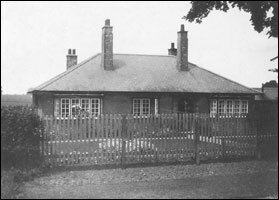 |
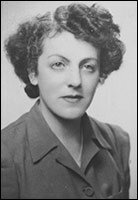 |
|
The bungalow at Newton Bromswold
|
Audrey in the 1940's
|
|
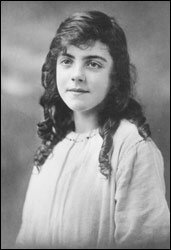 |
|
Audrey Flanders aged 14
|
|
|
|
|
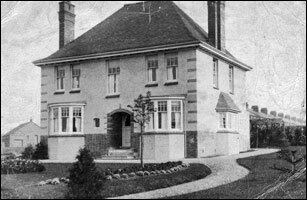 |
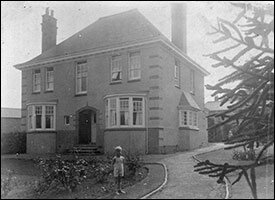 |
|
|
Wellingtonia - 1929 - note the little Monkey Puzzle Tree - in the late 1930's - the tree grew well -
|
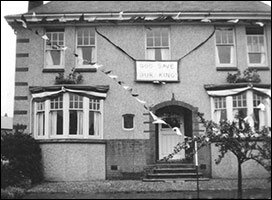 |
|
Decorated for the Coronation in 1937
|
So it was that David Clark grew up at ‘Wellingtonia’. His grandfather, Charles had built a pigeon loft and belonged to the Rushden Pigeon Club, and he taught David how to look after the pigeons. The club would meet at the Railway Hotel on race days and held an annual dinner at the Oakley Arms. Occasionally they would have a special day out to Newmarket. Audrey was sometimes asked to drive baskets of pigeons out in their Austin 12 to certain locations and set them free at a given time. Charles employed Charlie Newell to help look after the pigeons and together they would await the arrival of the pigeons to log their time and work out the speed. One day Audrey was fed up with this and let all the pigeons out together!
During the war some of the pigeons were a welcome addition to the meat ration and Audrey would preserve some of the eggs in isinglass.
|
|
|
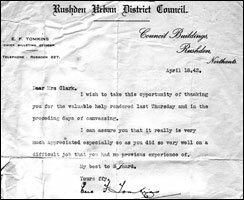 |
|
Letter thanking Audrey for her help
|
|
Bernard Clark was a boot & shoe operative and in 1931 he worked at Eatons and later went to Jaques & Clark where he was on welting machines. When war broke out in 1939 Bernard volunteered and at first was an air raid warden, in charge of 50 men. In 1941 he worked for Bignells at Raunds, in charge of making the children's shoes. He was also an engineer for Cox & Wright. In 1941, after the initial call up of young men, there was a recruitment drive for older men and Bernard volunteered aged 35. His fellow recruits called him granddad when training as aircrew. During this time Bernard collected autographs of the crew for his young son, David, until he trained as wireless operator and air gunner in 1942. Sadly he was posted as missing following a crash in 1944, and Audrey put more effort than ever into her voluntary work.
|
David went to Alfred Street School and was there on the day in October 1940 that a bomb was dropped and although he was not injured he lost a friend. Later he went to Bedford School and Audrey was “doing her bit” for the war effort with the Women’s Voluntary Service.
She had been a billeting officer for the WVS and had some evacuees to stay at ‘Wellingtonia’, and from March 1944 to October 1944 she was a car pool driver in London. At the end of 1944 she left ‘Wellingtonia’ and took David to stay with her sister Doris Bailey at Stanwick.
|
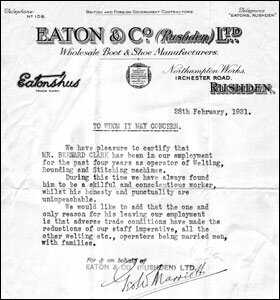 |
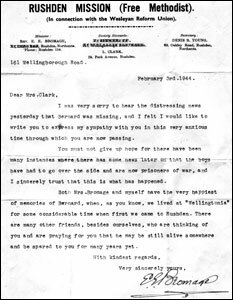 |
|
A 1931 letter from Eaton & Co, confirming that Bernard was leaving their employ due to their need to reduce their staff numbers, and all others were married men.
|
A letter of condolence from Rev. Bromage, of the Mission Church, and his wife. They had lived at 'Wellingtonia' when they first came to Rushden.
|
 |
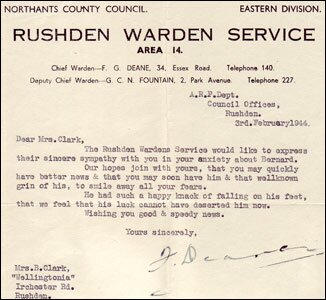 |
|
Letter confirming that Bernard was a Group Warden appointed by the Council & Inspector of Police at the beginning of the A.R.P. Organisation
|
Letter of condolence from the Warden Service expressing their sympathy, after Bernard was posted as missing. Our hopes that "you may soon have him & that well-known grin of his to smile away all your fears".
|
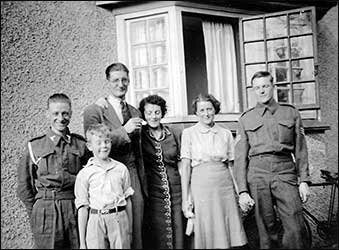 |
|
Wellingtonia c1942
l-r: ?, David, Bernard, Audrey, ?, ?.
|
|
|
Later, at Chelveston, she met an American serviceman, Ralph Wrench, a typesetter by trade, and in June 1946 she took David with her to start a new life in Jacksonville, in America with Ralph. But they did not settle there, so decided to return to England. They took a train to New York to get the boat, but there was dock strike and it lasted for a whole month. Audrey and David spent a couple of nights at the Tafte Hotel, but funds were not going to last so they moved to a small apartment. Every day Audrey would go the docks and pester the officials for a berth on a boat and in the end was told “Madame you will be on the first boat out of here”, and they finally sailed on the MV John Ericsson.
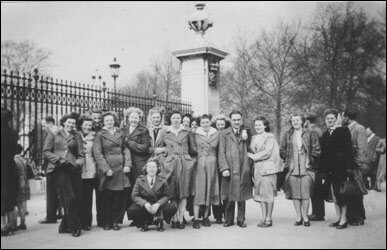 |
So Audrey and David arrived home with little to keep them going; they stayed at Higham Ferrers for a short time and then moved to Newport Pagnell. There, Audrey found work doing a milk round, during the very bad weather and deep snow of the early months of 1947. Later that year David and his mother were living at the Land Army Hostel in Milton Ernest, Bedfordshire, where Audrey became a warden.
A trip to London for the Land Army girls - Audrey is the second lady from the right - outside Buckingham Palace.
|
|
|
A job at the Works Department at Chelveston Airbase in 1948 then brought them back into Northamptonshire.
David joined the Chelveston Scout group run by the vicar there, and went on a camping trip to Heacham.
|
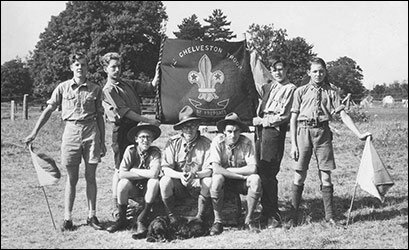 |
|
David (2nd from right) holding the Scouts' Flag
|
|
right - Audrey's award from the AFEX at Chelveston Base - where she was Personnel Officer
|
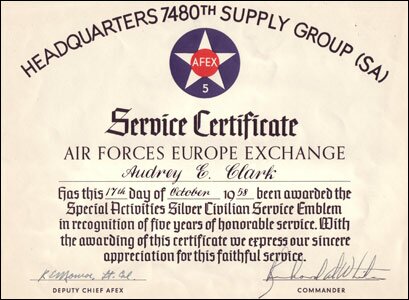 |
|
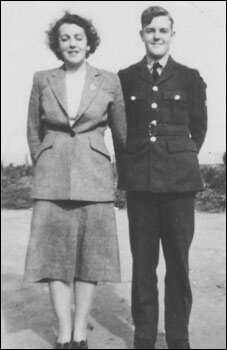 |
|
Audrey with David in 1949
|
|
During this period Audrey purchased the dilapidated ‘Castle Cottage’, in the nearby village of Yelden.
In 1949-50 she worked at Alvaston Manor as a receptionist and by then David was in the RAF. Audrey worked tirelessly to repair the cottage as and when funds allowed. From there she took a post at a Volunteer Agricultural Camp at Blunham, Bedfordshire, where workers came down from the North of England to take working holidays.
In 1953 she returned to Chelveston and worked as a Personnel Technician for AFEX and by 1957 was Personnel Officer, but left and went to work for Smedley’s at Kings Lynn, Norfolk.
|
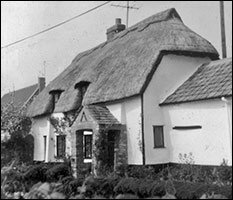 |
|
Castle Cottage, Yelden
|
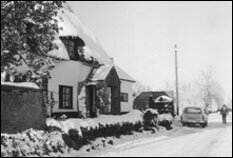 |
|
| A return to Chelveston came in 1961 where Audrey was running an ‘Open Mess’. When the Americans left in 1964 she took another catering job as cook/housekeeper at a hostel for single policemen in Banbury, Oxfordshire. |
|
From a newsclip - Banbury 1965
Dashwood Terrace House is New Home-From-Home for the 'Force'
When some of Banbury's single policemen come off duty they do not have to go back to their 'digs' or a bedsit at the station, they go home to their private hotel. For eight of Banbury's single policemen have been fixed up with the ideal home from home.
They live at 1 Dashwood Terrace, Banbury, in a house that has been rented by the police for the accommodation of policemen who are single and away from home. They are well looked after by their housekeeper, widow Mrs. A. Clark, and they don't have to worry about creeping in when they come off duty late for fear of waking the landlady.
The policemen, at present five constables and two cadets, have their own sitting room with a television set and they can entertain their friends there. Mrs. Clark, who has her own bed-sitting room, prepares all the meals.
Banbury police decided to rent the house because some single men used to live at the police station and now, with more staff coming to Banbury, the space they used is needed. Also "digs" are difficult to get in Banbury and some landladies do not like the idea of their lodgers coming in at all times of the day and night after their duty shifts. Nearly all the men at Dashwood Terrace have lived in "digs" before.
Freedom said P.C. Ken McGregor whose home is in Gloucestershire, "It is much better here than living in 'digs,' we have more freedom and yet we do not have to look after ourselves."
"The men who lived at the station could never get away from the job," said, Chief Inspector G. Barratt.
The house, which has been re-decorated, is rented for £15 a week. It is the first time the police have rented a house for several policemen in the County. It is proving so successful that other forces may follow the Banbury example. Two men share a bedroom in the house and they have facilities for washing and ironing their clothes. "But I still send mine to the laundry," said one.
A part-time cleaner comes in to help Mrs. Clark. There is a small garden tended by the men, but that is purely voluntary!
Said Chief Inspector Barratt, "We are very pleased with the way the idea has worked out, the men have independence but they are looked after as well."
|
|
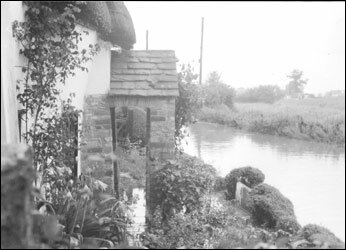 |
|
Castle Cottage in the floods
|
|
Various other catering jobs kept Audrey busy and travelling the country, and she would also do special catering for clients in their own homes.
In 1982 Audrey sold Castle Cottage and moved to Earls Barton for a well-earned retirement. She died on the 31st of August at Avenue House, Court Estate, Rushden, and was buried at Yelden on September 8th 1998.
Note: David Clark, who shared these family details with us, died in 2014.
|
|
|
|
|
|


















